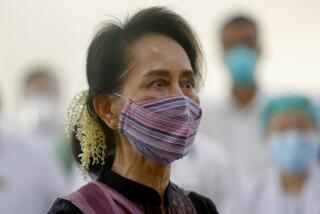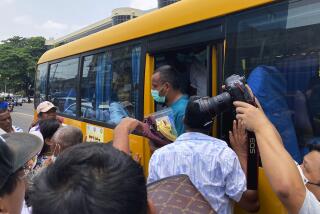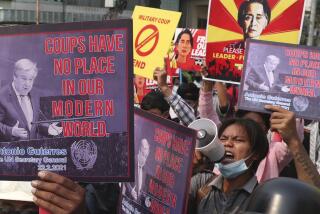Myanmar’s Suu Kyi meets with democracy party, junta official
- Share via
UNITED NATIONS — Pro-democracy leader Aung San Suu Kyi met leaders of her party for the first time in three years Friday and told them she was optimistic that a two-decade-long stalemate with the Myanmar government may be thawing, her spokesman said.
Suu Kyi and three colleagues from the National League for Democracy also met with the country’s labor minister, Aung Kyi, to prepare for talks with senior leaders of Myanmar’s military regime.
Party spokesman Nyan Win, who attended the talks, quoted Suu Kyi as saying she believed “the ruling authorities have the will for national reconciliation,” according to news reports from Myanmar’s main city, Yangon.
The meetings are a small but significant change in the military government’s dealings with Suu Kyi, who has been in detention for 12 of the last 18 years and has not been allowed to meet with her party since 2004.
After international criticism of its crackdown on peaceful demonstrations in September, the government relented and allowed Suu Kyi to meet with Aung Kyi in October, and again with him and her colleagues Friday. But analysts caution that the government’s move may be less a breakthrough than part of a pattern of cosmetic concessions under pressure.
Aung Din, an exiled opposition leader based in Washington, said the junta has a history of briefly letting up on dissidents during periods of international attention, then tightening up once that attention wavers.
Suu Kyi has been in and out of prison and house arrest since her party won 1990 elections and 82% of parliament seats in Myanmar, which is also called Burma. The junta refused to hand over power and increased its harassment and arrests of opposition leaders.
“I would say it is a breakthrough if she is able to meet the leadership without preconditions and to talk face to face as equals,” said Aung Din, who is the executive director of the U.S. Campaign for Burma. “They have imposed some conditions for Aung San Suu Kyi, and she wants to discuss them with her party. She said she is willing to engage with the military for the sake of the country, and she is not calling for confrontation with government or regime change.”
On Thursday, U.N. envoy Ibrahim Gambari ended his second visit in two months to Myanmar. He was instrumental in arranging the talks with Suu Kyi. But the regime rejected his proposal that he mediate talks, and that political prisoners and monks arrested in recent demonstrations be released. He is due to return to the country in a few weeks after reporting to the Security Council.
The U.S. ambassador to the U.N., Zalmay Khalilzad, met with about 60 Burmese activists as well as with human rights groups in New York on Friday and assured them that the U.S. would support democracy and human rights in Myanmar.
“There have been some positive steps, but that’s insufficient. More needs to happen,” he said. “What we think is needed is a genuine reconciliation, a transition to democracy, release of all prisoners, reconciliation talks with the government and the opposition led by Ms. Aung Sang Suu Kyi, with the U.N. being present.”
Burmese activists said they were pleased with pressure by the U.S., which in September increased its sanctions against the regime. But they want the Security Council to impose an arms embargo on the isolated nation.
“The generals know how to play the game, and how to buy time,” said Win Maung, a leader of Burma Point, an expatriate group in New York. “We know what we have to do, and that is keep the pressure on.”
More to Read
Sign up for Essential California
The most important California stories and recommendations in your inbox every morning.
You may occasionally receive promotional content from the Los Angeles Times.










